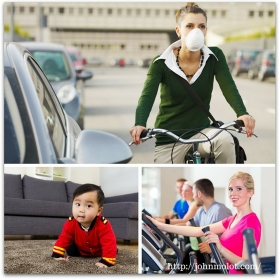 Take a deep breath
Take a deep breath
Every day, on online health and fitness sites, on TV and in popular magazines, media is informing us that the food we eat is affecting our health. In our doctors’ offices, diet becomes an issue as it impacts our medical conditions. But we seldom hear about the air we breathe even though it is a well known fact that pollution is having a major impact on human health. The Royal College of Physicians (RCP) and the Royal College of Paediatrics and Child Health (RCPCH) recently released an excellent review called Every Breath We Take. What they are telling us is that it’s not just the outdoor pollution that’s having an impact on our health. The indoor air is polluted as well.
You can’t hide from pollution
The Canadian Air Quality Health Index or “AQHI” is a scale designed to help individuals make decisions to protect their health by adjusting their level of outdoor activities and limiting exposure to air pollution outdoors. But it does not make any mention of staying indoors. The Air Quality Index used in the USA offers the same information, although it does advise people to stay indoors when the air is extremely bad (“red alert”). On the other hand, the American Academy of Family Physicians advises us to stay indoors as much as we can during days when pollution levels are high. The family physicians are using solid logic; the outdoor air pollutants are lower indoors, but there is no published evidence showing that staying indoors actually helps. None.
Consider this: all the data we have accumulated on the adverse health effects from air pollution are based on watching the varying patterns of health, comparing good days to bad. That’s how we figured out that more people go to the hospital or morgue on bad air days.
We are already spending close to 90% of our time inside, inhaling the toxic outdoor pollutants, like particulate matter, nitrous oxides and ozone, at lower indoor levels. To complicate matters, the indoor environment is actually 2 to 5 times more polluted with chemicals from indoor sources, which actually have an additive effect when they are combined with the pollutants that come in from outside.
What’s making us sick?
What is making us sick or die on bad air days? Is it just the outdoor pollutants, most of which are inhaled at the lower levels indoors, or the additive effect of the chemicals from indoor sources combined with the outdoor pollutants? Maybe there is another explanation – the mixture also makes new toxic chemicals. For example, the levels of ozone are 30 to 70% lower indoors, but it reacts with the oils on your skin and the volatile organic compounds emanating from consumer products – cosmetics and cleaners – to produce other toxic chemicals, like formaldehyde. We can actually measure lower levels of ozone when there are more people in a room because it’s mixing with the other chemicals, not necessarily for the better.
The average adult inhales 23,000 times daily – drawing in over 3,000 gallons of air. Every day. Reducing physical activities on bad air days prevents increased exposures because we don’t breathe deeply. This seems quite logical, but there is no published evidence that it helps.
What else we can do
The easiest and most efficient way to protect ourselves is to increase the ventilation – take the air in your house, throw it outside, and filter the air coming in. The most efficient system to do that is an air exchanger, which can be installed alongside your furnace. It’s important to filter with a high efficiency particulate air (HEPA) filter to reduce the contamination from outside. If you have a condition linked to air pollution, ask your physician for a prescription for an air exchanger – you might be able to use the purchase of one as a medical tax credit. If you don’t live in a place that allows you to install an air exchanger (such as an apartment building) at the very least clean the indoor air with a portable purifier that uses a HEPA filter with activated charcoal to help reduce the levels of both the particulate matter and chemical gases.
If you’re a canary you can feel it
It’s also important to remove as many sources of indoor air contamination as you can by eliminating the chemical products that you purchase. They are also making people sick. The environmentally sensitive canaries and the medical literature both attest to this!

Pingback: Don’t hold your breath! | sondasmcschatter